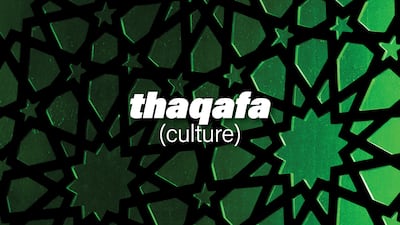American novelist Thomas Wolfe believed culture to be the “arts elevated to a set of beliefs”, while poet and writer Allen Ginsberg is quoted as saying that “whoever controls the media, the images, controls the culture”.
This week’s Arabic word of the week, thaqafa, which translates to culture, is an all-encompassing concept. In English and Arabic, the term culture encompasses a broad yet thorough set of different ideas and practices that have varying relevance and definitions to different people.
While thaqafa translates to the English word culture, it also refers to concepts of refinement, cultivation, education and civilisation. More commonly, however, it refers to the collective knowledge, values and experiences shared societally, and to the idea of education specifically. It can also mean to have knowledge or an understanding in all things from the sciences to the arts.
Thaqafa is a noun made up of three Arabic letters, tha, qaf and faa. It is derived from the verb theqafa, which is defined as the action of defeating someone through knowledge in a particular subject.
The connection between the origin of the word and thaqafa denotes the idea that the more knowledge a person possesses the more cultured they are, which in turn is a reflection of how smart they are. To be truly cultured in the Arabic context means that one is aware or knowledgeable in all or most topics.
There are various categories of thaqafa specific to certain areas of study. Thaqafa aamma refers to possessing general knowledge, while thaqafa mehaniyya is educational culture, particularly delving into the study of a particular topic in a specialised field.
Thaqafa wataniyya is knowledge associated with a particular country or nation, and thaqafa shaabeyya is the knowledge of an indigenous culture. Thaqafa assasiyya refers to an understanding of the essence or the foundations of a particular topic.
There are a number of words derived from the same root of thaqafa that are related to the idea of culture and knowledge.
Thaqqafa means to teach or bestow knowledge on someone else or to enrich or improve the state of something, while tathaqqafa refers to someone acquiring knowledge on their own to gain a better understanding of the world.
The noun mouthaqqaf refers to someone who is educated or very knowledgeable. Tathqeef is the process of learning or becoming more knowledgeable while mouthaqqif is a teacher of knowledge such as a lecturer and tathaqqafa is the exchange of knowledge between two parties on the same or various topics.











































































